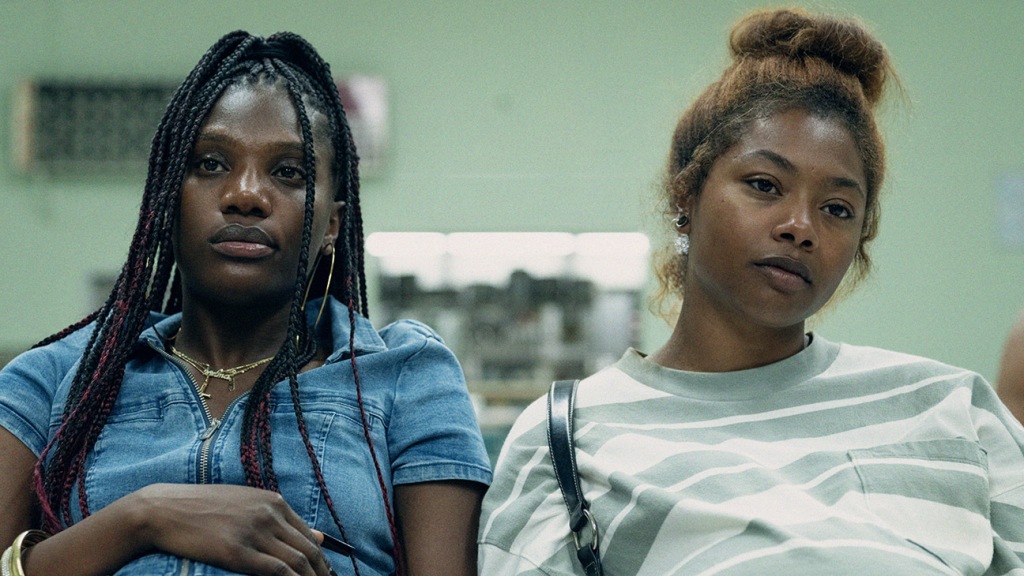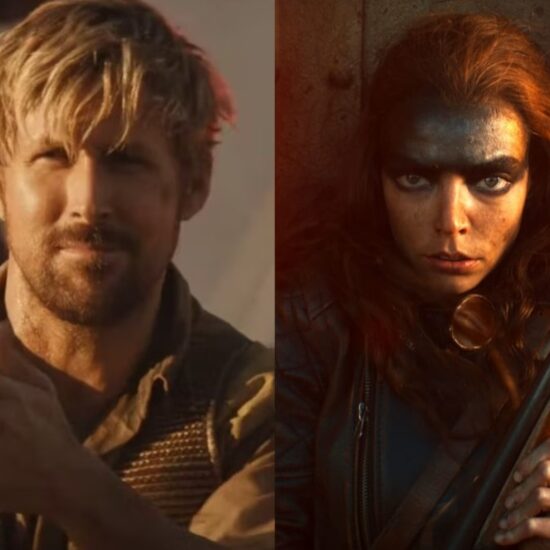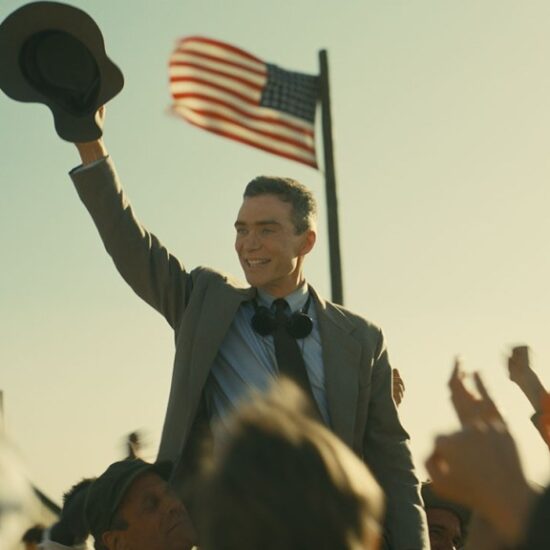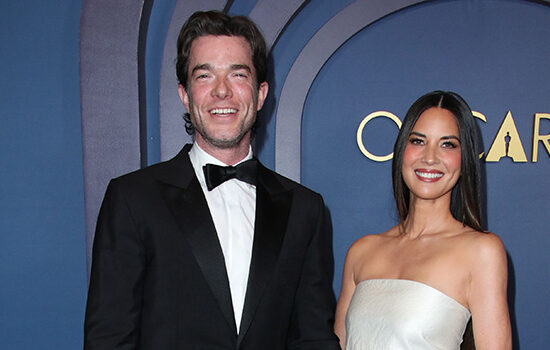
At just 29 years old, Savanah Leaf has already built a career in three fiercely competitive industries and racked up impressive accolades in each one. In 2012, the London-born, California-raised former professional volleyball player competed for Great Britain in the Summer Olympics. In 2020, the visuals she directed for blues singer and guitarist Gary Clark Jr.’s single “The Land” received a Grammy Award nomination for best music video. And on July 7, Leaf’s debut directorial feature film, Earth Mama, will be released in theaters nationwide.
Earth Mama tells the story of Gia (Tia Nomore), a young mother fighting for custody of her two oldest children who are in the foster care system while pregnant with her third. The film was shot in Oakland, California, in just 26 days last spring and builds upon Leaf’s previous work, the documentary The Heart Still Hums, which she completed with actress Taylor Russell. The project represents both a new chapter and a new challenge for the Bay area filmmaker.
“I didn’t imagine any of this, but at the same time I did,” she tells The Hollywood Reporter. “I was just hoping for a film that I believed in, a film that I could stand by and that I would want to watch.”
A24 came on board as the movie’s main financier just as Leaf finished the script and was ready to begin pre-production in March of 2022. Earth Mama made its debut at the Sundance Film Festival in January and won the Audience Award at the San Francisco International Film Festival in April. It counts actress Erika Alexander and rapper and singer Doechii among its stars.
“I feel lucky that I found partners who would enable me to make a film in a way that I respected and like,” Leaf says. “I don’t think that’s an easy task, especially not in America. I knew I would make a film — I believed in myself to do that — but I didn’t know who would be involved or how it would get done. I feel really excited by the community and group we did it with.”
When did you first develop an interest in filmmaking?
I’m trying to pinpoint it and I don’t know for sure, but when I got injured playing sports in 2015, I really started looking at film as an option. In college I played sports, but I studied psychology, and in a way, I think of film as a combination of psychology — working in a team environment, which is very much sports — and artistic expression. I’ve always taken photos or wrote or painted. So it sounds crazy that I’m in film and I was an athlete, but I kind of always had the culmination of all of this in different places in my life.
Would you say it’s harder to make it to the Olympics or to get a film made?
Making it to the Olympics is about your physicality. What was crazy about trying to become the best as an athlete versus trying to get a film made is some people just will never get there because they’re not meant for that sport. I felt really lucky because I jump high and that was my thing. I’m tall and that enabled me to get in the room in volleyball in a way that a lot of people can’t. So, there’s an ease in that I’m athletic, there’s an ease in that that ability was given to me. But still the mental toughness, the physicality was draining. I feel like the way I would wake up and work and grind and work off of two hours of sleep; that felt like it prepared me for anything. I feel like film couldn’t do anything to me that sports did to me physically.
But getting a film made, my head was spinning. There’s something you have to really encounter within yourself. As a Black woman, oftentimes I feel like I’m not supposed to be in this space. Or people are constantly telling you, “You’re in this space because they needed to support a Black woman these days.” People are constantly questioning whether or not you’re supposed to be here, and that’s something I’ve always struggled with. Whereas in sports, it always felt like I was supposed to be there. So, for me, that’s been the toughest thing, and it probably will continue to be the toughest thing. Like, how do I feel good and like I’m supposed to be here? How do I not feel worried about my voice when I’m speaking up in a room, or whether I’m articulating myself the right way? So, from an emotional standpoint, I feel like that’s really tough.
In one of your Instagram posts, you said it feels like your whole life has been building up to this film. How so?
This film is really about motherhood in its many forms. I think about my own mother and my relationship to her, and I think about the mothers that I grew up around, the coaches that impacted me, my best friends who were kind of mothering me at times. All of them really felt like they drew into this moment.
When I was 16, my mom adopted my sister and I got to know her birth mother. So that was another perspective on motherhood that really impacted the first writing of this film. I was kind of imagining myself and what she was going through, and drawing upon all these different mothers who have been through so much and that really impacted me in so many ways. That’s what I mean when I say it feels like it’s been a lifetime of making this. I’ve been drawing upon motherhood and how people have survived and thrived through it all my life.
Savanah Leaf on the set of Earth Mama.
Courtesy of A24
Earth Mama is also connected to your 2020 documentary The Heart Still Hums. How did that short film come about?
The first draft of my script was more directly based on my relationship to my sister. And then I did the short doc focusing on five different mothers, some of whom had given their children up for adoption, some who had their children taken away from them due to the foster care system, and some who were foster children and now mothers themselves. I was looking at all of these different women as well as my relationship to my own sister, and I was using that almost as emotional research for the film. Then when I came back to writing the script, it was like it unleashed another side of the story. I had to dive further into research.
But the next round was more about the ins and outs of the foster care system. What does it mean to be fit to parent and what are the parameters? And what are the rules and what are their measurements and how are people analyzed? Then I started to go back and read about other mother’s situations in books, news articles and magazines. It was a really long process of taking emotional research and then going to the granular aspect of why these obstacles are so difficult to get through. What is the simple solution? Is there not one?
Although it’s a feature film, Earth Mama has a bit of a documentary feel to it as well. Can you talk about your approach to shooting this project?
There’s a documentary feel because I have these kinds of testimonies in the film that are real women and men who have been through these circumstances. One of them is actually from the documentary and came into the feature, and she actually opens the film. So, there’s this observational documentary lens in the feature fictionalized film. Even how we shoot Gia, the camera’s quite far away and we let the scenes run through as a whole. We never just shoot the very beginning of a scene; we’re shooting everything and letting her go through that emotional arc, and trying to do it in a way that feels honest and authentic and real and grounded so that it doesn’t feel like this glorified drama. I don’t need that. I don’t need to be forced into trauma. I’m very sensitive to that and I didn’t want to do that with this film.
The earth aspect of the film title shows up quite literally in the visuals, particularly in the scenes where we see Gia interchange between walking around the streets of Oakland and roaming through the forest. What are you communicating there?
Oftentimes I was thinking about this lineage of Black women who came before Gia, and also the lineage that will come after her. I was thinking about the trauma that we inherit, but also thinking about how you sometimes want to break away from that trauma. Also, sometimes there’s beauty in that lineage and there’s a strength in that lineage; there’s a resilience. I wanted to show that wasn’t just a dialogue between characters, it was something that you felt. Like you could really feel her inner world. Sometimes that’s hard to place into some words of dialogue, I just don’t think that has the same resonance. And I think, for me, that magical realism allowed you to dive into her physiological inner space.
Tia Nomore portrays Gia’s experience and that of many other young mothers who’ve had to deal with the foster care system so authentically. How did you find her for this role?
Tia was such a special person to come into the mix. She’s a rapper, musician and performer, and we were looking at a lot of local performers because we were thinking if we were to cast somebody who has never acted before it would be great if they also have experience performing, not just for their acting but for the endurance it would take doing this long of a project and knowing I can trust them with that. Tia had that experience, and she also was a recent mom. She had just given birth a year prior to us filming and she was still lactating and still breastfeeding, and still feeling so many emotions around birth and labor and postpartum. So, it was really interesting hearing about that from her perspective and she was training to become a doula, so she had this connection to motherhood that felt really deep and was also very on the surface because it was happening to her then. She was learning how she was going to mother by being a mother right then and there, and I think it really played into her role and into who Gia is as well.

Earth Mama
Courtesy of A24
It’s also striking to see Doechii in this way, given how her music career has exploded in the past year.
When Doechii auditioned, they actually sent me the “Crazy” music video before it was released. In a way I was like, “I don’t fully see how it relates to this role, but I do see how it relates to her as an actor,” and I think it showed me that she’s willing to go there. She has this crazy strong work ethic and she’s willing to just put herself out there. She came to the auditions, she came to set with no makeup on, just really stripped down. She knows when to turn up on time and she pours herself into it and knows how to do that in a really beautiful way. I think she really feels like a friend I had growing up and that’s what was exciting to me when I met her. She’s just a natural actor.
Going back to that idea of asking what’s the simple solution during your period of research, I found myself asking a similar question when the film ended. Like, what do I do with what I just experienced? What are you hoping audiences take away?
One of the things is, I hope that people who have been through similar situations feel heard and not alone. Oftentimes in these circumstances, it feels like you’re running into a wall and film is this really beautiful medium where you can feel less alone. I hope that people feel that it represented their story or pieces of their story honestly. I hope for other people that don’t know this story as closely, that it sheds light on a subject matter that’s not discussed often in a way that invites you in, rather than forces you into emotions and that it feels sensitive and respectful. I hope it sparks conversations and communities supporting communities. There are so many brilliant people in this world that are already working on this issue, and hopefully it helps align some of those organizations together.
Interview edited for length and clarity.
Earth Mama is now playing in theaters.














